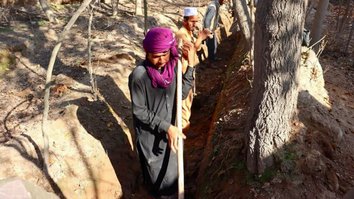KUNDUZ -- More than 2,000 families near Faizabad city, the largest city in Badakhshan, have not had access to drinking water since the Taliban came to power more than a month ago.
"Upon the fall of Faizabad city to the Taliban -- among other problems -- residents of different parts of the city have been facing a shortage of drinking water," said Rahmatullah Hamidi, a resident of Shahr-e-Jadid in Faizabad.
The Taliban took over Faizabad on August 11 and since have not provided money to purchase fuel to operate the generators at the water treatment plant.
Pipes supplying water have been dry since August 23 and residents are using water from the Kokcha River, which is relatively close. However, its water is not potable, according to Hamidi.
Some families fetch water from the Kokcha River on donkeys, while others buy barrels of river water from shops in the city, which is a major economic challenge given that most everyone is unemployed, Hamidi said.
"People carry water from the Kokcha River on donkeys and sell each 20-litre barrel for 20 to 50 AFN (22 to 56 US cents), but the water is not clean or healthy enough to drink," he added.
"There is no water in the pipes. Those who can afford it buy mineral water from the shops, but those who can't have to fetch water from Kokcha and other rivers," said Ziauddin Khwahani, a tribal elder in Faizabad.
Since families use unhealthy water from the Kokcha River, many women and children have contracted various diseases, he added.
"My children have been suffering from diarrhoea for several days. Doctors told me that the disease was caused by unclean water," said Mohammad Naeem Rasekh, a resident of Faizabad.
Doctors told Rasekh to boil the water before drinking it.
No income
The lack of water comes as Faizabad's government remains closed.
Since taking over Kabul on August 15, the Taliban have not taken any tangible steps to reopen banks, resume government services or address the public's daily problems.
With the arrival of the Taliban, the salaries of civil servants -- including teachers, soldiers, and other employees -- have been suspended, which has naturally driven up unemployment and poverty, said Khanjar Baig Rasuli, a member of a local council in Faizabad.
"The price of water is extremely high. The Taliban must set the price according to people's economic condition, to address the issue of drinking water shortages," he said.
Potable water has not been running because of the closure of banks and a lack of cash, according to officials of the Water Supply Department in Badakhshan.
The issue of shortage of drinking water will be resolved soon, Mohammad Zahir Stanekzai, director of the Water Supply Department in Badakhshan province, told Salaam Times.
"You are witnessing a major change in the country. This undoubtedly had an impact on my work too," he said.
"The fact that banks are closed and that we cannot use the money we have in the bank is also undoubtedly a problem."

![Local residents wait in line for water in Faizabad city, Badakhshan, on September 23. [Courtesy of Haseeb Fakhar]](/cnmi_st/images/2021/10/05/31992-b-585_329.jpg)






